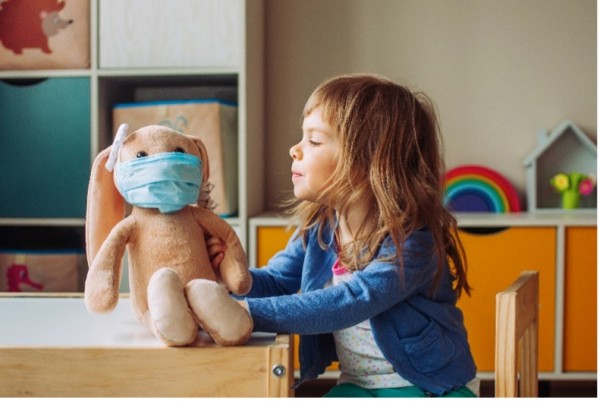
Before I begin this blog, I want to preface that I am not writing about “to mask or not to mask.” That is not the question. The question that I want to discuss in this blog is “How can adults help preschool children with the challenges that come with face mask wearing at such a young age?”
The idea of our precious preschool children wearing masks presents a conundrum. As a teacher, mother, and grandmother, a child wearing a mask meant one of three things: 1) we were having a party, 2) we were wearing a costume to act to portray a character, or 3) the child was so sick that he/she had to wear a mask so that they would not contract a fatal illness. COVID-19 has added a new reason for children to wear masks – to stay healthy and potentially keep others healthy. As an early childhood educator, I know the value of seeing expressions on faces has for a child’s development. Masking the precious faces of preschoolers and the adults in their lives tears at my heart.
Time has passed since the pandemic began and we are now seeing solid research being released based on studying the disease and its effects over time. Mayo Clinic posted an article (August of 2021) stating that they have followed numerous studies regarding effects of a child wearing a face mask*. They found that “…studies have unequivocally shown that there are no negative health effects on children from wearing a mask.” I feel it is important to share that Mayo’s article emphasized that children with neurodevelopmental disorders, should not wear a face mask due to challenges removing the mask by themselves.
American Academy of Pediatrics also addressed mask wearing on their site, Healthychildren.org, in another article released recently**. It is called “Mask Mythbusters: Common questions about Kids & Face Masks.” The pediatric doctors who authored the article stressed the following based on their current research in pediatric pulmonology:
- Masks do not weaken the immune system.
- Masks do not trap carbon dioxide .
- Masks do not interfere with a child’s lung development.
- Masks made from breathable material will not block the oxygen that a child needs.
Knowing these four points reduced my apprehension regarding face masks and children. But, as an educator, I find myself struggling with the effects on social/emotional development as well as language development. I found another 2021 article by American Academy of Pediatrics (“Do Masks Delay Speech and Language Development?”) that addresses both topics***:
- “…no known studies that use of a face mask negatively impacts a child’s speech and language development.”
- “Visually impaired children develop language and speech skills at the same rate as their peers.”
It is understandable if your preschool child seems afraid of wearing a face mask at first or simply refused to wear one when needed. Here are some tips on how to take the “fight” out of preschooler face mask wearing:
Be positive about face masks when around children. If you are positive, chances are children will be positive
Read a child-friendly book about wearing a face mask such as “Heroes Wear Masks: Elmo’s Super Adventure.”
Put a face mask on a favorite large stuffed animal to model how to wear a face mask.
Show your child pictures of other children wearing them.
Draw one on their favorite book character.
Let the preschooler choose a face mask for the adult to wear.
Play dress up at home and practice wearing the face mask.
Talk about it wearing a face mask while looking in the mirror.
Let the child go shopping and choose their own face masks.
Decorate them so they're more personalized and fun.
Answer any questions regarding wearing face masks in simple language.
It is completely understandable to be concerned about delays in your preschool child’s social/emotional development because of face mask wearing. Here are some tips to help keep your young child socially connected and in touch with people’s emotions:
- Turn off electronic devices when at home and focus on communicating verbally.
- Have preschoolers make eye contact during conversations.
- When wearing a face mask and talking with a young child, speak slower and use plenty of vocal inflection to express emotions.
- Talk openly about emotions and feelings.
- Softly touch the child’s arm or shoulder when talking to establish a loving connection.
- Show photos of people expressing emotions.
Here is a link to a set of free flashcards of people showing basic emotions. Print them out and talk about them with your preschooler. You can always turn them into a game by having children guess what the person is feeling. Print a second set and turn them into a memory game.
Sources
*https://newsnetwork.mayoclinic.org/discussion/benefits-of-kids-wearing-masks-in-school/
**https://www.healthychildren.org/English/health-issues/conditions/COVID-19/Pages/Mask-Mythbusters.aspx
***https://www.healthychildren.org/English/health-issues/conditions/COVID-19/Pages/Do-face-masks-interfere-with-language-development.aspx


